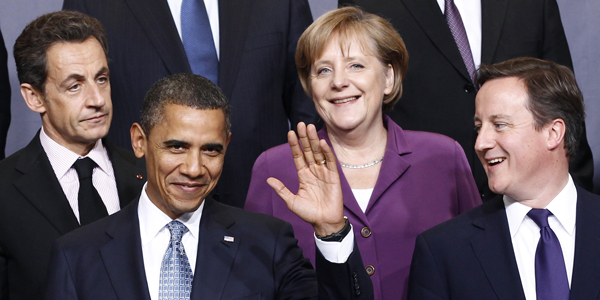
From John C. Kornblum, atlantic-community.org: One often meets Europeans these days who say their belief in Europe was nothing but an illusion. The EU is experiencing a serious crisis of confidence among its citizens. Equally worrisome is the growing loss of confidence by its essential protector, the United States. America is effectively also a European power whose interests are deeply integrated across the Atlantic. Even today, without the support and presence of the United States, the EU as we know it could not exist. But continuation of this active support is anything but certain. America no longer sees its own identity reflected in global structures of multilateral diplomacy. It judges partners by performance rather than historical ties. In this race, Europe is bound to lose. . . .
Europe and the United States have reached a defense policy stand-off reflected dramatically in former U.S. Secretary of Defense Robert Gates’ recent valedictory speech. America is consumed by global crises and cares little for Europe’s preoccupations. With publics schooled on the mantra of the EU, European leaders have been unable to communicate a credible strategic narrative to the United States. Talk with American military planners these days and you learn that Europe is no longer a part of their strategic calculations. America’s next generation will care even less. . . .
For nations dedicated to expanding their global economic and cultural influence, Europe’s declining ability to protect its security interests is cause for major concern. If current trends continue, Europe’s central geographic position, highly developed infrastructure, and commercial skills should lead to growing engagement across the globe. In order to protect these interests, Europe desperately needs an updated defense concept and a revitalized alliance with the United States. Luckily, Europe is not without options. Despite its current weakness, Europe still maintains an amazing advantage not available to anyone else—it is tied together with the greatest military power in the history of mankind in a formal military alliance. The United States is committed to defend, militarily if necessary, European security interests within the area defined by the treaty.
Events since 2001 have demonstrated that the United States is now willing to expand NATO’s reach beyond the area originally covered. This is a bounty unprecedented in history. In a more rational world, Europeans would run, not walk to re-consecrate this bargain. Drastic increases in defense budgets are probably not necessary. More important would be an open dialogue which seeks new strategic unity. An initiative for a “crisis dialogue” with a broad agenda for a new “Atlanticism” would likely receive a positive response in Washington. What Americans want is a sense of strategic consensus and a willingness to take political risks in support of joint interests. Europeans are engaged in many parts of the world and could offer important insights. America’s withdrawal from military conflicts and its need to cut its defense budget offer an excellent opportunity to define a new global Atlanticism.
John Kornblum is a former US ambassador to Germany and a member of the advisory board of the Atlantische Initiative, the publisher of atlantic-community.org. This essay was first published by Carnegie Europe. To reinvigorate debate over European foreign policy and Europe’s role in the world, Carnegie Europe is publishing a series of essays from leading policymakers, diplomats, experts, and journalists on Strategic Europe over the coming weeks. A new essay will appear every day. (photo: Reuters)
Image: reuters%206%2014%2011%20Sarkozy%20Obama%20Merkel%20Cameron.jpg
